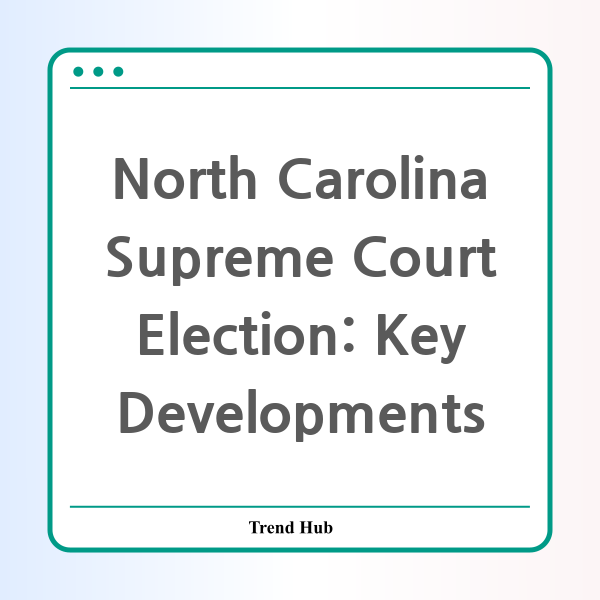* This website participates in the Amazon Affiliate Program and earns from qualifying purchases.

As the dust settles on the 2024 North Carolina Supreme Court election, a significant ruling has emerged that may alter the trajectory of the state's judicial landscape for years to come. Will Democratic incumbent Allison Riggs hold onto her position, or will the Republican challenger, Jefferson Griffin, manage to overturn the results? Let’s break down the latest developments in this closely watched election.
A federal judge recently ruled that disputed ballots must remain in the final count, a decision that, if upheld, would affirm Riggs's narrow victory by just 734 votes. U.S. District Judge Richard Myers stated that any attempt to remove ballots after the election without due process would violate the U.S. Constitution. This ruling marks a critical moment not just for the candidates involved, but also for the integrity of the electoral process in North Carolina.
Following the November 2024 election, where over 5.5 million ballots were cast, Griffin's campaign filed formal protests, claiming that several thousand ballots should be disqualified. These ballots were deemed ineligible because of issues related to voter identification or residency. However, Judge Myers emphasized that changing the rules post-election could lead to chaos and undermine public confidence in both state and federal courts.
In his ruling, Judge Myers ordered the North Carolina State Board of Elections to certify the results based on the final tally after recounts. This means that regardless of Griffin's protests, the ballots cast by compliant voters will continue to count. In his 68-page decision, Myers articulated, "You establish the rules before the game. You don’t change them after the game is done." This sentiment resonates deeply in a climate where electoral processes are often scrutinized and questioned.
Riggs, who has become a pivotal figure in the Democratic Party's efforts to regain a foothold on the state Supreme Court, expressed her gratitude for the ruling, stating, "Today, we won. I’m proud to continue upholding the Constitution and the rule of law as North Carolina’s Supreme Court Justice." Meanwhile, Griffin's team is deliberating on their next steps, including a potential appeal to the 4th U.S. Circuit Court of Appeals.
At the heart of the Republican challenge is the assertion that only legal votes should be counted. Griffin's team attempted to argue that ballots cast by certain groups, including overseas voters and those failing to provide proper identification, were unlawfully counted. However, Myers pointed out that these arguments seemed selective and were focused primarily on Democratic-leaning areas, raising concerns over potential voter disenfranchisement.
The implications of this ruling extend beyond individual campaigns and touch upon broader themes surrounding voting rights and electoral integrity. Democrats argue that efforts to invalidate votes post-election serve as a dangerous precedence that could pave the way for similar tactics in other states. In contrast, the state Republican Party maintains that safeguarding legal voting practices is paramount.
This election's outcome is expected to play a significant role in shaping the judicial landscape in North Carolina. With Riggs’s victory allowing the Democrats to strengthen their position on the Supreme Court, it could influence future legal decisions on critical issues ranging from voting rights to social justice. As both parties brace for the possibility of legal battles ahead, the focus now shifts to what the final certification will bring and how it will affect public confidence in democracy.
While the legal fight continues, one thing is clear: the stakes in this election are high, and the outcome will reverberate throughout North Carolina’s political landscape for years. Stay tuned as we continue to track the developments in this pivotal contest.
* This website participates in the Amazon Affiliate Program and earns from qualifying purchases.